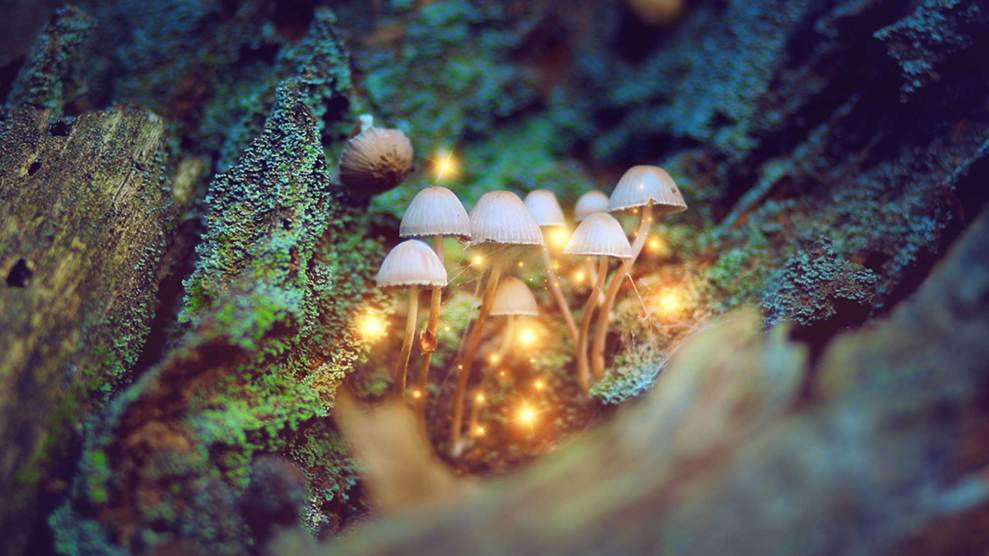
Captblack76/Shutterstock
You know Michael Pollan from his blockbuster book The Omnivore’s Dilemma, an entertaining exploration of the thorny decisions surrounding what we eat. Or maybe you read his most recent title, Cooked, which was adapted by Netflix as a four-part documentary series.
But the celebrity author hasn’t always been so obsessed with what people put on their plates. “Before I started writing about food, my focus was really on the human relationship to plants,” Pollan explained on the most recent episode of Bite, Mother Jones’ new food politics podcast. “Not only do plants nourish us bodily—they nourish us psychologically.”
The thought spurred Pollan to leave the kitchen and take a residency at Harvard, where he’s researching flora with psychedelic properties for a new book. Part of the project covers recent experimental trials using psilocybin (a compound found in magic mushrooms) to treat cancer patients’ anxiety about death, which he wrote about for The New Yorker.
Like his 2001 title, The Botany of Desire—which mined history, sociology, and biology to examine human desire through our cultivation of four plants—Pollan promises his next book will be a multi-disciplinary affair: “My mode as a writer is to layer different perspectives: the scientific, the philosophical, the political, the journalistic. When you layer them you get a really wholesome, interesting picture.”
Some of that picture emerged during our mind-bending conversation on the hidden history of psychedelics. Here are some of the most fascinating things Pollan revealed:
There’s a natural path from writing about horticulture to writing about drugs. “I went looking for the best gardeners of my generation and I realized they were all growing cannabis underground. So I went to Amsterdam where High Times had an annual convention and you could kind of more openly discuss your horticultural techniques. That was my introduction.
Then I had written a piece in 1997 for Harper’s called “Opium Made Easy.” Somebody had sent me this underground press book by a character who was telling people, “Hey you can grow your own opium and here’s how you do it.” At the time you could buy opium poppies in any garden center, and a lot of people grew them in their gardens without knowing that it was opium. This guy I’m writing about gets arrested by the feds for the crime of owning a box of dried poppy heads he’d bought at a florist shop in Seattle. They really threw the book at him because he’d written telling people how to do it.
It ended up becoming this piece not only about how to grow opium, and the history of opium, but the drug war. There’s this crazy wrinkle in the drug laws where you can grow papaver somniferum (opium poppies) as a plant legally—the seeds are legal, the flowers are legal, the seed pods are even legal—as long as you don’t know it’s a controlled substance. As soon as you know that, you’re violating the controlled substances act. Sorry to have spoiled that for you.”
Psychedelics are all around us. “They’re produced by some plants, like the peyote cactus, but also fungi. Psilocybin is a mushroom. If you want to look for it, start on college campuses—look in the landscaping. People report finding it in police stations, court houses. When you carry mushrooms, you’re leaking spores. They’re very small, they’re very light.
And LSD actually, even though it’s semi-synthetic, it’s derived from the ergot fungus—the fungus that affects grain. That’s this interesting co-evolutionary relationship between us and these very strange molecules. How did we evolve this relationship with these plants and why is it adaptive to be able to change your consciousness? Is it adaptive? Why is this such a pervasive human desire?”
People have used psychedelics for thousands of years. “Native Americans in Southern Mexico had used psilocybin mushrooms as part of their religious ceremonies and divination and medicine for hundreds and hundreds of years. But after the Spanish Conquest, this went underground. The Indians called it teonanácatl, which meant “flesh of the gods.” It was kind of this weird mirror image of the Christian sacrament, but better because this one you actually did meet God whereas the other one you had to have faith that this crazy Eucharist actually worked. The Spanish felt very threatened when they watched people tripping out on these mushrooms and tried to crush that worship.
We didn’t know [psilocybin mushrooms] grew in North American until the 1970s. It was a group of students at Evergreen State University that became obsessed with mushrooms—as they still are up there, I’m sure. They began looking and said ‘oh my god, they’re all over the Northwest, too.’ We had assumed it was a Mexican phenomenon but in fact, it’s not.”
And authorities have always been threatened by them. “They’re very threatening substances to institutional power, whether it’s religious institutions or the state. One of the interesting things about religions is that they are founded on a spiritual or mystical experiences of some leader at some point, who has direct contact with the divinity, whether it’s Moses or whoever started Scientology. And in the history of religion you have these upwellings of people wanting to have their own direct experience of God, and not going through proper channels. There are very few religions that will support that because essentially the hierarchy falls apart if everyone can have their own direct contact with God.
The various crackdowns on witches, many of whom use psychedelic drugs, should go under that rubric of a drug war. Drug wars are always with us.
LSD was perceived to be very disruptive in the ’60s. When Timothy Leary invited America’s youth to ‘Tune in, turn on, and drop out,’ those words sound a little goofy to us now, but they were really threatening at the time. They were basically inviting America’s youth to get off the path that their parents and their government had designed for them. They made a lot of things look silly and that’s very threatening to the powers that be. Nixon thought that they were discouraging people from fighting in Vietnam. And that a lot of the anti-war activity and the non-conformity were being fueled by LSD and to some extent marijuana. So he came down very hard. He really begins the modern drug war.”
Using psychedelics for therapy is not a new idea. “In the 50s, before this drug was very controversial, LSD was made widely available to researchers in North American and in Europe and there was this flourishing of research in therapy.
Probably the most extensive and the most promising at that time was research into alcoholism and whether LSD could be used to help people get sober and stay sober. There were thousands of people. It got beyond the experimental stage in Canada and was widely prescribed and they claimed they had success rates of about 50 percent, which was better than anything else that was out there.
The idea is to have a big enough experience that is sort of resets your attitude to your addiction, your sense of your own agency. Some people think it’s about forming connections. If you’re an addict, you have a very powerful connection to the bottle, or the cigarette, and that connection takes over your life. It’s more important than your connection to your family, to your friends, or anything else. The [psychedelic] drugs give you a very strong connection to other people or to nature and that formerly big connection becomes very small in your cosmology, the one to the cigarette of the bottle.
After long being suppressed, research is starting to emerge again. “At Johns Hopkins right now they are expanding their study of smokers, and looking at the efficacy of using mushrooms to break a smoking habit. They finished working in phase-2 trial with cancer patients who have disabling anxiety and existential distress from their diagnosis, and helping them deal with the prospect of death. The next step is a phase-3 trial which is looking increasing likely will happen. The FDA appears to be open to it. Funders have also come forward.
Then there is a big alcoholism trial getting started at NYU with hundreds of patients over five years, which is essentially trying to replicate that work done in the ’50s with presumably better controls and better protocols. It combines cognitive behavioral therapy and a couple doses of psilocybin. And they just started dosing people.
And then there’s a really interesting study going on at Johns Hopkins and NYU which involves giving psilocybin to religious professionals to see how it affects their work and their belief system. You have many religious professionals, people who are in charge of congregations or churches, who haven’t necessarily had a mystical experience themselves. Wouldn’t it be interesting if they did? One of the research questions very active in the mind of the investigators I think is: Will there be a commonality of imagery or experience, from one denomination to another, or will we find what Aldous Huxley called the perennial philosophy, that all religious traditions at bottom are the same, with slightly different imagery and symbolism?”
People like to talk about their trips. “People are sharing some really difficult material with you: childhood trauma; the challenge of describing what is an ineffable experience; some really crazy stuff, crazy imagery. You come out of these interviews emotionally drained and sometimes they are very tearful. I’m surprised by how open people are about it. One of the hallmarks of the experience is the desire to share it. The storytelling process is how you make sense of it.”
You can’t really study psychedelics without considering some big, existential questions. “I don’t think of myself as a spiritual person. In fact, I’m kind of spiritually retarded. But I am at a period in life when you start thinking about some of these issues.
The first thing you learn about consciousness is that nobody knows shit about consciousness. It could be any number of things. Physicists speculate that it’s a property of the universe like matter and energy. This is a pretty wild idea. But they also believe there are seven other dimensions that we’re not aware of, occupying our universe right alongside this one.
I am stone-cold materialist on any question, so for me to talk to people who are convinced that consciousness is not something that only happens inside your skull, but is a prop of the universe and the brain is more of a radio tuner than a generator of consciousness—this is pretty out there for me. But I’m trying to keep an open mind.”
Being on psychedelics is like… You’ll have to listen to the episode to hear Pollan’s answer! And while you’re there, subscribe for more biweekly episodes of Bite.
Bite is Mother Jones‘ podcast for people who think hard about their food. Listen to all our episodes here, or subscribe in iTunes, Stitcher, or via RSS.



















